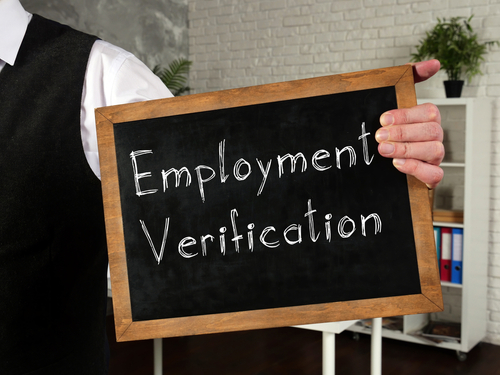With many U.S. states having experienced record-low unemployment rates earlier in 2023, finding qualified candidates continues to be a major challenge for many employers across the whole country. According to HireRight’s 2023 Global Benchmark Report, over three-quarters of respondents from North America—comprising HR, risk, and recruitment professionals—expect talent acquisition to be a significant challenge for the remainder of this year, and three-fifths (59%) expect it to be a major challenge over the following 3 years (2024 to 2026). With this in mind, it’s even more important that employers take steps to avoid making potentially costly bad hires.
There are many highly publicized examples from around the world of hiring that’s gone spectaculary wrong and employers that rue the day they rushed to employ someone without the necessary due diligence. One way businesses might help mitigate this risk is by verifying their candidates’ employment histories. Employment verification checks are often an essential part of a company’s background screening program and can empower businesses to make smarter, more informed recruitment decisions.
In this article, I explain what employment verification checks are, how their usage varies by region, and why businesses should consider them as part of their employment screening program.
Verifying Employment History
Employment verification checks are used to confirm that the employment details provided by candidates on their résumés or job application forms are accurate. When combined with other background screening checks, verifying candidates’ past employment details can provide hiring teams with greater confidence that their candidates have the work experience required for the roles to which they’ve applied.
A typical employment verification check may only require basic information from candidates, such as the names of their past employers, former job titles, and their employment dates. This might cover all employment during a fixed period (e.g., 5 years) or a certain number of past positions. However, confirming this employment history can be difficult and time-consuming to manage in-house. For this reason, many businesses work with third-party background screening providers to verify their candidates’ job histories.
Regional Variation in Adoption Rates
Despite their potential value in helping employers confirm the information candidates provide on their résumés is accurate and that they have the experience needed for the position, employment verification checks are surprisingly often underused by businesses in North America. According to HireRight’s 2023 Global Benchmark Survey findings, only half (54%) of North American respondents said their organizations verify their candidates’ past employment details as part of their employment screening program.
However, adoption of these checks in the rest of the world is much higher. In Europe, the Middle East, and Africa (EMEA), employment checks were cited as the most common background check, conducted by 90% of respondents from the region. In Asia-Pacific (APAC), 84% of survey respondents said their business conducts employment verifications.
It’s possible that some North American employers are foregoing employment verification checks to help reduce background screening turnaround times and get new talent in the door faster. After all, in a candidate-driven market, a “leave-no-stone-unturned” approach could delay hiring or prompt candidates to withdraw from the recruitment process to pursue another offer. However, omitting employment checks from your candidates’ background screenings could prove costly.
Serious Consequences
Failing to verify your candidates’ employment histories could have serious consequences—candidates could enter your workforce without the skills and experience required for their roles. This could put your reputation, client relationships, bottom line, and even workplace safety on the line.
HireRight’s 2023 Global Benchmark Survey found that employment verifications are one of the areas where employers most often find candidate discrepancies during the background screening process. Around a third (32%) of North America respondents said they found these kinds of discrepancies. In the rest of the world, the percentage of respondents finding employment discrepancies is much higher—67% in EMEA and 73% in APAC.
Additionally, a study conducted by Standout-CV in October 2022 found that over half (55%) of people surveyed said they lied on their résumé at least once, respondents aged 18 to 25 were the most likely to have admitted lying on their CV (67%), and previous work experience was the area where résumé lies were most often told (55%).
Broad Benefits
As employers seek to fill open positions quickly, employment verification checks, along with other relevant employment background checks, can help employers make better-informed hiring decisions and help reduce organizational risk.
It’s also important to avoid bias or discrimination by screening everyone for the same position equally. A cohesive, unified approach to background screening can help ensure consistency across your workforce. A strategic partner with expertise in local and regional laws and requirements impacting background screening programs could help companies develop a program tailored to their industry, legal requirements, and time constraints.
Whether you’re screening candidates due to a legal requirement or simply to help weed out individuals who aren’t qualified for the jobs they’ve applied to, doing so can help provide peace of mind that you have taken appropriate measures to ensure your candidates truly meet all the qualifications required to be valuable members of your team.
Mary O’Loughlin is EVP of the Americas at HireRight, a global provider of on-demand employment background checks, drug testing, Form I-9 and employment and education verifications.

